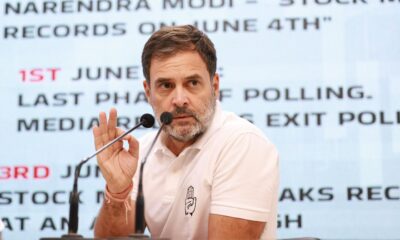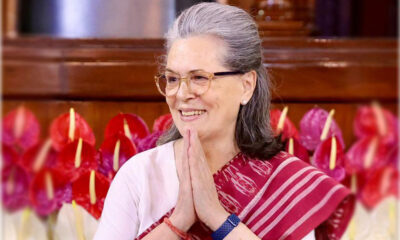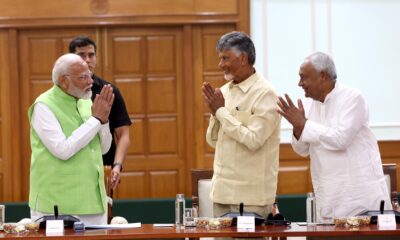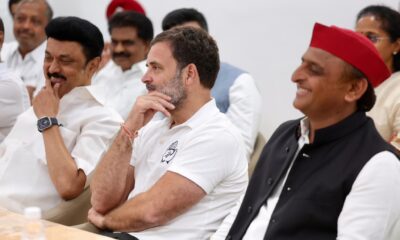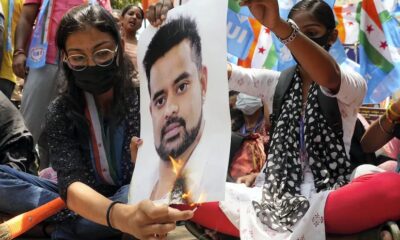india
Gujarat: BJP Leader’s Police Station Birthday Sparks Congress Criticism
A viral video showing a BJP leader’s birthday celebration at a police station has sparked political controversy, with Congress leaders questioning the propriety of the event.

Political tensions are mounting after a video of a BJP leader’s birthday celebration at a police station went viral on social media. The footage shows Deputy Commissioner of Police (DCP) Kanan Desai celebrating the BJP leader’s birthday in the presence of police personnel in the chamber of a police station in Ahmedabad, Gujarat. The video, widely circulated by Congress leaders, has raised questions about the ruling BJP’s conduct, with comments like, “Is the police station becoming an office of the BJP?”
BJP leader Bday in Police Station
The video depicts DCP Kanan Desai of Zone-4 in Ahmedabad, accompanied by BJP leader Himanshu Chauhan and folk artist and BJP leader Yogesh Gadvi, inside a police chamber. DCP Desai and her police team are seen singing “Happy Birthday,” while Chauhan cuts a cake. Congress leaders have seized upon this footage, accusing the BJP government of misconduct.
Amit Chavda, leader of the Congress party in the Assembly, shared the video, criticizing the perceived transformation of police stations into BJP’s political arenas. He condemned the focus on PR and publicity over public safety, questioning whether tax-funded police stations are meant for maintaining law and order or serving as BJP’s party venues.
Former Congress president Jagdish Thakor criticized the BJP government, alleging special arrangements for birthday celebrations of BJP workers and leaders at police stations in Gujarat. He questioned whether such events, like the one at Daryapur police station in Ahmedabad, are standard under the BJP government and sought clarification from the Minister of Home Affairs of Gujarat regarding authorization for such activities.
The video’s widespread circulation prompted the Ahmedabad Police to issue a clarification. They claimed the event was not a birthday celebration but a blood donation day event promoting Hindu-Muslim unity. According to the police, the event was part of the preparations for the upcoming Rath Yatra festival in Ahmedabad. After the blood donation camp, officers and social workers gathered at the police station. During this time, a local woman brought three cakes to congratulate everyone on the successful organization of the program. Yogesh Gadvi mentioned that it happened to be Himanshubhai’s birthday, and they extended their birthday wishes to him.
The police press release stated, “There were no ‘happy birthday’ messages on the cakes. However, Yogesh Gadhvi mentioned that it happened to be Himanshubhai’s birthday, and they extended their birthday wishes to him. The gathering was not intended to celebrate anyone’s birthday or serve any political purpose.”
This incident has further fueled the ongoing political rivalry between the BJP and Congress in Gujarat. Congress leaders have been vocal in their criticism, questioning the propriety and ethics of the BJP’s actions. The BJP, on the other hand, maintains that the event was misrepresented and taken out of context.
The controversy highlights the sensitivity and scrutiny surrounding political actions and events, especially those involving public officials and state resources. The opposition’s quick response to the video indicates the high level of political vigilance and the readiness to capitalize on any perceived missteps by the ruling party.
In the politically charged environment of Gujarat, such incidents are not isolated. They reflect deeper issues of trust, governance, and the relationship between political entities and state institutions. As the video continues to circulate, it serves as a reminder of the ever-present political tensions and the importance of maintaining a clear distinction between state functions and political activities.
The situation underscores the need for transparency and accountability in governance. Public officials and political leaders must navigate their roles carefully to avoid perceptions of impropriety and ensure that their actions are in line with their duties to the public. As this incident unfolds, it remains to be seen how it will impact the political landscape in Gujarat and the broader implications for the relationship between the BJP and the Congress.
In conclusion, the viral video of a BJP leader’s birthday celebration at a police station has sparked significant political controversy. The event, initially perceived as a misuse of state resources for political purposes, has been clarified by the police as part of a community initiative. However, the opposition’s strong reaction and the ongoing scrutiny highlight the fragile and contentious nature of political dynamics in Gujarat. The incident serves as a critical reminder of the need for clear boundaries and ethical conduct in the intersection of politics and state functions.
india
Congress Slams Waqf Bill as Unconstitutional, Vows to Fight in Supreme Court
In a bold move, the Congress party has announced plans to challenge the recently passed Waqf (Amendment) Bill, 2025, in the Supreme Court, labeling it a direct assault on India’s Constitution and the rights of the Muslim community.

In a bold move, the Congress party has announced plans to challenge the recently passed Waqf (Amendment) Bill, 2025, in the Supreme Court, labeling it a direct assault on India’s Constitution and the rights of the Muslim community. The legislation, which cleared both houses of Parliament after heated debates, has sparked widespread controversy, with opposition leaders arguing it undermines religious autonomy and equality.
The Waqf Bill, passed by the Lok Sabha with 288 votes in favor and 232 against, and later by the Rajya Sabha with 128 votes to 95, now awaits President Droupadi Murmu’s assent to become law. However, Congress leader Jairam Ramesh, the party’s General Secretary, took to X to declare that the Indian National Congress (INC) will soon contest the bill’s constitutionality in the nation’s highest court. “We are confident and will continue to resist all assaults of the Modi government on the principles, provisions, and practices contained in the Constitution of India,” Ramesh stated, emphasizing the party’s commitment to protecting constitutional values.
The bill introduces significant changes to the Waqf Act of 1995, including the inclusion of non-Muslim members in Waqf Boards and the Central Waqf Council—a move critics argue is discriminatory and lacks justification. Opposition leaders, including Congress and AIMIM chief Asaduddin Owaisi, have slammed the legislation for imposing arbitrary restrictions on Waqf property management, which they say violates Articles 14, 25, 26, 29, and 300A of the Constitution. These articles safeguard equality, religious freedom, minority rights, and property rights, respectively.
Opposition Leaders Rally Against Controversial Waqf Amendment Bill, Citing Threats to Muslim Rights
Congress MP Mohammad Jawed, who has already filed a petition in the Supreme Court, argued that the bill disproportionately increases state control over Waqf affairs compared to other religious trusts, such as those of Hindus and Sikhs, which enjoy greater self-regulation. The amendments also remove the Waqf-by-user doctrine—a principle upheld by the Supreme Court that recognizes properties as Waqf through long-standing religious use—further fueling concerns about the erosion of Muslim religious rights.
The debate in Parliament was intense, with the Rajya Sabha discussion stretching over 13 hours. Opposition leaders like Mallikarjun Kharge called the bill “anti-Muslim” and demanded its withdrawal, alleging it was designed to target Waqf properties for eventual privatization. “The intention behind this is questionable,” Kharge said, warning of potential communal polarization. Meanwhile, the government, led by the BJP, defended the bill as a step toward transparency and inclusivity, with Prime Minister Narendra Modi calling its passage a “watershed moment” for socio-economic justice.
The controversy has also led to political fallout, with two Janata Dal (United) leaders resigning in protest over their party’s support for the bill. As the legal battle looms, the Congress party’s challenge in the Supreme Court could set a precedent for how religious and property rights are balanced in India’s diverse democracy. Will the judiciary uphold the opposition’s claims, or will the Waqf Bill stand as a new framework for managing Muslim endowments? The nation watches closely as this contentious issue unfolds.
Karnataka
Karnataka BJP Kicks Off Overnight Protest Against Price Hikes and Muslim Quota
Led by BJP’s state president Vijayendra, the demonstration targets the Congress-led government’s recent price hikes and its controversial decision to introduce a 4% reservation for Muslims […]

Bengaluru, Karnataka: The political air in Karnataka is buzzing as the Bharatiya Janata Party (BJP) launched an overnight protest at Freedom Park in Bengaluru on Wednesday, April 2, 2025. Led by state president BY Vijayendra, the demonstration targets the Congress-led government’s recent price hikes and its controversial decision to introduce a 4% reservation for Muslims in government contracts. With emotions running high, this protest marks a bold stand against what the BJP calls a “burden on the people.”
The protest kicked off at 11 a.m. and stretched into the night, with Vijayendra slamming the Siddaramaiah government for making life tougher for everyday citizens. He pointed to the recent Rs 4 increase in Nandini milk prices—now the third hike since Congress took charge—as an “Ugadi gift” that’s left families struggling. “This government promised relief but delivered only rising costs,” Vijayendra said, vowing to keep the pressure on until the hikes are rolled back.
A Fight Against Rising Costs and Policy Shifts
The BJP isn’t stopping at milk prices. Vijayendra accused the government of jacking up water tariffs, petrol costs, and more, hitting the poor and farmers the hardest. He also took aim at the 4% quota for Muslims in public contracts, labeling it “unconstitutional” and a move that sidelines other backward classes like SCs, STs, and OBCs. “This isn’t about fairness—it’s about appeasement politics,” he argued, promising a statewide awareness campaign starting April 10 to rally public support.
The protest saw a strong turnout, with BJP MLAs, MLCs, former legislators, and district leaders joining in. Vijayendra stressed that this is just the beginning, with plans for demonstrations across all district centers on April 4 and taluk-level protests on April 5. “We’re here to fight for the people, not just make noise,” he added, urging the government to rethink its policies.
A Divided Response
While the BJP rallies its base, the Congress government defends its actions. The milk price hike, they say, supports dairy farmers by covering rising production costs, with Karnataka Milk Federation (KMF) Chairman Bheema Naik noting that prices here are still lower than in states like Gujarat or Delhi. On the Muslim quota, the government insists it’s based on socio-economic backwardness, not religion, aligning with long-standing policies under previous administrations.
Yet, the BJP remains unconvinced, accusing Congress of playing the minority card to win votes. The tension spilled into the streets of Bengaluru, with protesters chanting slogans and holding signs, creating a lively yet tense atmosphere. Police kept a close watch, ensuring the demonstration stayed peaceful as traffic flowed nearby and shops stayed open.
What’s Next for Karnataka?
This overnight protest is more than a one-night stand—it’s a signal of bigger battles ahead. With the BJP gearing up for a statewide movement, and the Congress digging in, Karnataka’s political scene is heating up. Residents are left wondering: Will the government back down, or will this spark a longer fight? For now, the focus is on Freedom Park, where voices of dissent echo into the early morning.
Stay tuned as this story develops. Whether it’s about your grocery bill or community rights, this protest could shape Karnataka’s future. Keep checking for the latest updates on price hikes, Muslim quota debates, and more!
india
Waqf Amendment Bill Heads to Rajya Sabha Today After Lok Sabha Approval
New Delhi: After a heated debate and a late-night vote in the Lok Sabha, the Waqf (Amendment) Bill, 2025, is set to take center stage in the Rajya Sabha on Thursday, April 3, 2025. The bill, which stirred up quite a storm in the Lower House, passed with 288 votes in favor and 232 against […]

New Delhi: After a heated debate and a late-night vote in the Lok Sabha, the Waqf (Amendment) Bill, 2025, is set to take center stage in the Rajya Sabha on Thursday, April 3, 2025. The bill, which stirred up quite a storm in the Lower House, passed with 288 votes in favor and 232 against after more than 12 hours of discussion that stretched into the early hours. Now, it’s the Upper House’s turn to weigh in, and people across India are watching closely.
The Lok Sabha debate kicked off Wednesday afternoon and didn’t wrap up until the clock was nearing 2 a.m. Lawmakers from all sides dug into the details, with the ruling National Democratic Alliance (NDA) pushing hard for the bill’s passage. Alongside the Waqf Bill, the Lok Sabha also greenlit a resolution supporting President’s Rule in Manipur—a busy night, to say the least.
What’s on the Rajya Sabha Agenda?
Today, Union Home Minister Amit Shah is expected to bring the Waqf Amendment Bill to the Rajya Sabha floor. He’ll also move a resolution to confirm President’s Rule in Manipur, which was imposed on February 13, 2025, under Article 356(1) of the Constitution. The Upper House has carved out eight hours for this debate, so buckle up—it’s going to be another long one.
Meanwhile, over in the Lok Sabha, Thursday’s lineup includes the Coastal Shipping Bill, 2024, presented by Minister Sarbananda Sonowal. There’s also a statement from Minister Dr. Chandra Sekhar Pemmasani about pulling funds from the Contingency Fund of India to cover interest on Sovereign Guarantee Bonds for Mahanagar Telephone Nigam Limited (MTNL). It’s a packed day for Parliament as the Budget Session nears its end on April 4.
Why the Waqf Bill Matters
The Waqf (Amendment) Bill aims to shake up how Waqf boards—bodies that manage properties dedicated to religious and charitable causes in the Muslim community—are run. The government says it’s all about boosting transparency and efficiency, but not everyone’s on board. Opposition parties have called it “unconstitutional” and a direct attack on minority rights, sparking protests and fiery exchanges in Parliament.
After the Lok Sabha gave its nod, the bill now faces the Rajya Sabha test. With the NDA holding a strong majority in both houses, the government’s confident it’ll sail through. Still, the opposition isn’t backing down, promising to fight tooth and nail to protect what they see as a cornerstone of India’s secular fabric.
A Late-Night Victory in Lok Sabha
The Lok Sabha session was anything but quiet. Opposition members slammed the government’s handling of Manipur, even as they supported the President’s Rule resolution. Amit Shah defended the Centre’s efforts, saying every step has been taken to restore peace in the troubled northeastern state. By the time the Waqf Bill vote rolled around, the tally—288 for, 232 against—showed the NDA’s numbers held strong.
For many, the bill’s passage feels like a turning point. Supporters say it’ll modernize Waqf property management, while critics fear it’s a step toward centralizing control and sidelining Muslim voices. Either way, the Rajya Sabha debate today will likely set the tone for what’s next.
What’s at Stake?
This isn’t just about a bill—it’s about trust, governance, and how India balances its diverse communities. The Waqf Amendment Bill has already sparked nationwide conversations, from political rallies to social media buzz. As it heads to the Rajya Sabha, all eyes are on how lawmakers will shape its future—and what it means for the country.
-

 india2 years ago
india2 years ago“Major Crash of Sukhoi Su-30 and Mirage 2000 Fighter Jets in Madhya Pradesh”
-

 Sports2 years ago
Sports2 years agoWFI meetings on April 16, elections likely to be discussed
-

 india1 year ago
india1 year agoPM Modi Meets Deve Gowda for Seat Sharing Talks
-

 india1 year ago
india1 year agoBengaluru: False threat to bomb Raj Bhavan
-

 india2 years ago
india2 years ago“AIMIM to Contest 50 Seats in Upcoming Telangana Assembly Elections”
-

 Entertainment1 year ago
Entertainment1 year agoAnant Ambani: Controversy at the Ambani Pre-Wedding Bash
-

 Entertainment2 years ago
Entertainment2 years agoRajinikanth is Moideen Bhai in ‘Lal Salaam’
-
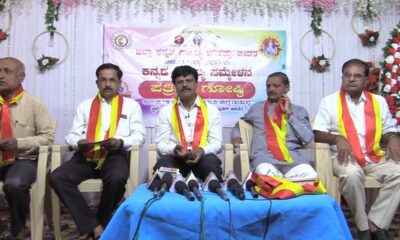
 Videos2 years ago
Videos2 years agoBidar News : Press Meet Organized By Zilla Kannada Sahitya Parishad



